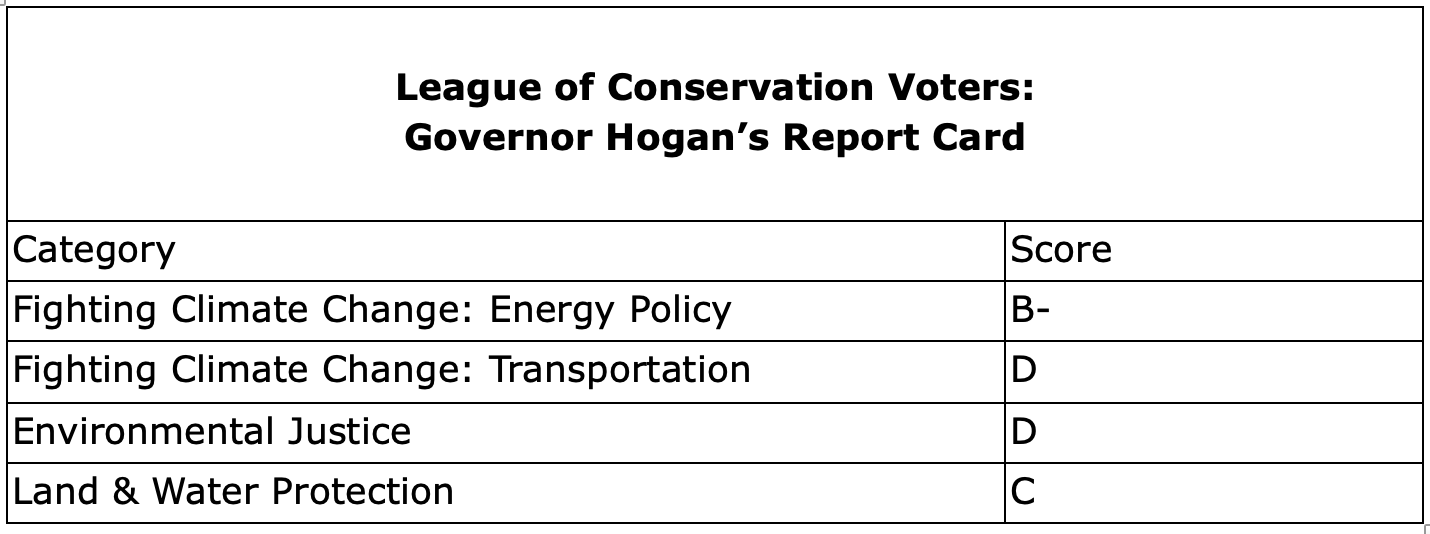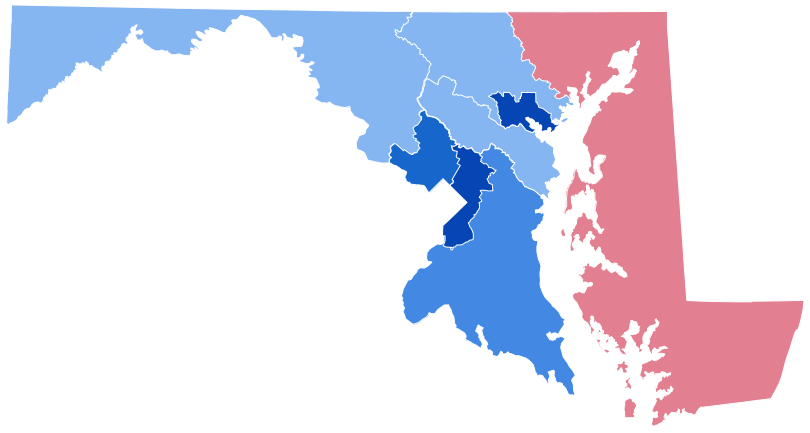Hogan on the Environment

Rising sea levels, recurring floods, and an increasing number of dangerous storms along with the hottest summers on record have made environmental issues among the most important and hotly debated issues across the country. This article takes a look at former Gov. Larry Hogan’s record on environmental policy during his two terms as Maryland’s governor from 2015 to 2023.
Hogan, a Republican, is now running for the U.S. Senate seat being vacated by retiring Democratic Senator Ben Cardin. This Senate race in Maryland is important at the national as well as the state level because the result could well be the deciding factor in which political party — Democrats or Republicans — will control the U.S. Senate.
Most environmental experts and organizations gave Hogan a mixed review, mentioning some progress on the issues, but noting that Hogan’s support of environmental and climate solutions was in general more talk than action.
The League of Conservation Voters (LCV) summarized Hogan’s record on the environment in their Governor’s Report Card, stating that “While Governor Hogan took positive actions, his leadership was inconsistent and he failed to adequately staff environmental compliance offices. He made strong statements committing to climate policy and the Chesapeake Bay that too often were followed by weak actions.”
Overall, the LCV’s Report Card gave Governor Hogan one “B-”, one “C”, and two “Ds” for his record on four key environmental and climate issues during his two terms in office.

Below are examples of the type of action or inaction that were considered in the report.
Several communities on the Eastern Shore have been struggling with air quality problems due to nearby large Concentrated Animal Feeding Operations (CAFOs). The Hogan administration declined to introduce any measures to reduce the sources of the air pollution but it did direct the MDE to install air monitors to record ammonia emissions from poultry farms, thus taking a small first step in addressing the issue.
However, when a court issued a ruling requiring the state to regulate poultry ammonia emissions as part of its Clean Water Act, Hogan declined to comply and appealed the decision, thus delaying any reduction of emissions and any relief from the unhealthy, polluted, and stinking air for the local residents.
The annual report from the Maryland Department of the Environment (MDE) on enforcement and compliance showed a significant reduction in enforcement of environmental regulations during Hogan’s tenure.
Transportation and Energy also had mixed, though generally low, reviews.
The LCV said that “On the whole, the Hogan administration’s record on environmental justice, especially with regard to public transit, and clean and renewable energy, is inadequate.” The LCV went on to state that Hogan’s Department of Transportation prioritized highway expansion, especially in rural Maryland, and “actively starved public transit of funding and support.”
This significant reduction in funding for the Maryland Transportation Administration (MTA) resulted in Maryland’s public transit system being listed as one of the least reliable in the entire country according to the Federal Transit Administration.
Governor Hogan’s budget did provide some limited support for the Purple line. However, Hogan canceled all plans for the Baltimore Red line which would have expanded public transportation into poorly-serviced areas of Baltimore, helping residents travel for both employment and shopping. The cancellation of the long-awaited Red Line disproportionately affected the poorer sections of Baltimore.
Hogan refused federal funding that would have provided nearly a billion dollars towards the construction of the Red Line. Then, adding insult to injury, Hogan redistributed the already approved state’s share of the money for the Red Line to nearly every other state jurisdiction except those that would have benefited from the Red Line. An investigation reported in the magazine Washington Monthly pointed out that many of these rerouted funds ended up going to highway projects located near properties owned by Hogan’s real estate investment firm, thus increasing their potential value.
On the positive side, Hogan supported tax credits for electric vehicles. This could help achieve the state’s goal of 300,000 electric cars by 2030.
Hogan’s record on clean energy has also been mixed. He opposed a ban on fracking in 2017 and planned to expand fracked gas infrastructure in Maryland. Then at the last minute, he changed course and supported the fracking ban as well as joining in the opposition to the Potomac Pipeline expansion through Western Maryland.
In a seeming contradiction of that decision, Hogan then supported expansion of the existing pipeline infrastructure of the Del-Mar Energy Pathway Project planned to run through the Eastern Shore. This inconsistency in energy policy, according to the LCV, leaves Hogan’s thinking and position on energy policies unclear. His policies may be evolving, or, as many think, such decisions may be significantly influenced by press and public pressure.
On the positive side, the Report Card points out that as governor, Hogan actively supported wind farms off the Atlantic coastline near Ocean City to generate clean electricity. He sought both grants and federal funding for these projects.
In both 2020 and 2021, Hogan’s administration proposed legislation that promised a path to 100% clean and renewable energy, a laudable goal. But the bill had questionable provisions that resulted in opposition by the environmental community. While those issues were mostly addressed in the 2021 version of the bill, the bill was submitted three weeks after the deadline thus assuring that it could not be considered during that legislative session.
The LCV concluded that “In both 2020 and 2021, the Hogan administration’s attempts to build legislative or community support for a 100% clean energy policy were lackluster. … The Hogan administration has been vague about its support for clean energy, and overall progress has been disappointingly slow.”
In the 2022 legislative session, the Maryland General Assembly approved new legislation to help with climate and environmental issues. The Washington Post called the bill “one of the most ambitious climate change plans in the U.S.” The article went on to state that the new plan “accelerates Maryland’s already ambitious environmental goals, seeking to cut emissions by 60% of 2006 levels by 2031, up from the current goal of 40%. It also spells out sweeping changes to get there.”
Governor Larry Hogan opposed the bill, calling it a “reckless and controversial energy tax.”
Continuing the mixed review trend, the LCV cited Governor Hogan’s record on funding land preservation and open space as excellent, while his water management policies ranked as inconsistent to poor.
Hogan advocated for full federal funding of the Chesapeake Bay Program during the Trump administration when significant cuts were proposed. Yet Hogan repeatedly opposed legislation for science-based oyster management and sanctuaries. Oysters are vital for the health of the Bay and for the economy of the fishing and oyster industry.
A summary of the Environmental Report Card for former Governor Larry Hogan with a link to download the full report can be found here.
A previous Common Sense article reported on Hogan’s career and his record of legislative vetoes on several issues, including abortion, education, and gun control.
Look for more articles on the candidates and their records in upcoming issues of Common Sense for the Eastern Shore.
Jane Jewell is a writer, editor, photographer, and teacher. She has worked in news, publishing, and as the director of a national writer's group. She lives in Chestertown with her husband Peter Heck, a ginger cat named Riley, and a lot of books.
Common Sense for the Eastern Shore







